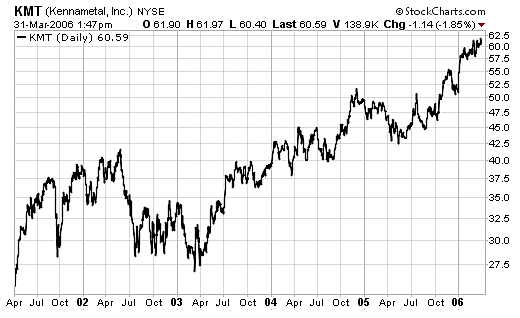| Home | About Us | Resources | Archive | Free Reports | Market Window |
The Spoils of WarBy
Tuesday, April 4, 2006
One of the bloodiest wars in history just ended. This war, which officially ended in 2002, was the world's deadliest since the Second World War. Four million people were killed. For perspective, 300,000 died in the Balkans as Yugoslavia split up. In the second Gulf war, still in progress, the body count is less than 30,000. Nine nations were directly involved in the fighting, as well as over twenty distinct armed groups, which make it the widest interstate war in this continent's history. They call it the African World War, and it took place in the Democratic Republic of Congo (DR Congo), formerly known as Zaire or the Belgian Congo. The DR Congo is the size of Texas, California and Alaska combined. It's loaded with minerals, including large deposits of copper, diamonds, tin, silver, and gold. But here’s the fact I really like: DR Congo is the wettest country in the world. Anything will grow, including cash crops like coffee, rubber and cocoa. The DR Congo used to be one of the richest countries in Africa, but its vast resources were a curse – they were the only things worth fighting for - and now it’s one of the world's poorest. The first Congo war started in 1996 as a way to grab power from the long-time dictator Mobutu Sese Seko. Mobutu had held power since 1971. His regime gave new meaning to instability and corruption. After two years of fighting, Mobutu escaped into exile and died soon afterwards. Rebel leader Laurent Kabila assumed power. The second Congo war started in 1998 as Kabila took on the forces of Rwanda and Uganda, among others. In January 2001, Laurent Kabila was assassinated and his son Joseph took power. The conflict contained some of the most horrific war crimes ever witnessed, including genocide, tactical spread of disease and mass amputations. Thankfully, this bloody war is now over and the Congo may bloom once again... In 2002, the different factions signed a comprehensive ceasefire. Four years later, the Democratic Republic of Congo is about to have its first democratically elected government since 1961. Elections are set for June 18th. The CIA World Factbook says, “In 2005, renewed activity in the mining sector, the source of most exports, boosted Kinshasa's [the capital] fiscal position and GDP growth. Business and economic prospects are expected to improve once a new government is installed after elections.” Right now, there are 18,000 UN troops stationed in the DR Congo. Ten days ago, Kofi Annan, head of the UN, visited Congo to meet with the president. When I hear war stories like this, I’m reminded of what one of the best investors of our time, Jim Rogers, has to say about the investment prospects of war-torn countries: “As an investor, I wait until the wars are fought, the borders are redrawn and the newly elected governments are eager to make something of the country's resources.” I pay attention to Rogers because he’s made a career by finding the right time to invest in foreign countries. As he’s pointed out many times, the end of a war is a great buy signal. It’s a great time to buy assets and raw materials cheaply. DailyWealth advice: The DR Congo has hit rock bottom, and it’s time to pile in. Now we need to find the right investment... Good investing, Tom Dyson Market NotesANOTHER “PICKS AND SHOVEL” PLAY HEADS HIGHER When you need to drill through or crush rock, you call Kennametal (KMT). Kennametal produces the cutting teeth, drill bits, and blades needed to crush rock, extract oil, and saw through timber. Your managing editor even remembers lugging around buckets of carbide-tipped teeth needed to cut drilled shafts into the limestone along the Mississippi River. These days, cutting and drilling through rock is a booming business. With the prices of raw materials like oil, platinum, and copper making new highs, the stock prices of companies that help remove the stuff from the ground are booming as well. As the world leader in things related to chewing through rock, Kennametal loves to see rising commodity prices. Rising commodity prices boost the spending budgets of miners and drillers. As those budgets go, so goes Kennametal. Right now, it’s boom times for all three. The past 5 years in KMT:
|
Recent Articles
|


